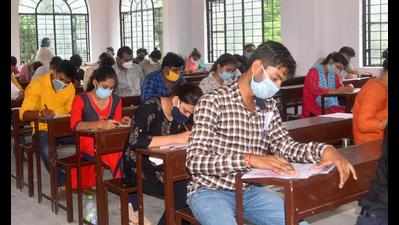- News
- City News
- lucknow News
- Time to augment quality of education through academic audit & assessment
Trending
This story is from May 8, 2021
Time to augment quality of education through academic audit & assessment
Of all the factors upon which depends the success of the Indian desire to join the league of developed nations, the quality of higher education ranks at numero uno. Call to raise Gross Enrolment Ratio (GER) in higher education also takes cognizance of unemployability as pointed out in several reports and by many policy makers of the country.
The new National Education Policy 2020 (NEP 2020) proposed the need to revamp education that would address both employment and employability.In view of the national goals of the country, NEP 2020 has formally brought in the role of academic audit.
There is an increasing interest in providing accountability mechanism to help higher educational institutions (HEIs) to independently assess the quality of their academics, augment the teaching-learning process and promote GER.
As a method, academic audit was first developed in the United Kingdom for the purpose of addressing the issues of quality enhancement of academics with the goal of identifying the gaps and bridging them for effective teaching and learning outcomes.
It is, therefore, important to have a clear comprehension of assessment methods, tools, and techniques to develop its implementation mechanisms. Especially for colleges, NEP 2020 suggests a stage-wise mechanism to attain minimum benchmarks for accreditation to become autonomous colleges and be made free from the affiliation process. In light of this, implementation of academic audit has become inevitable.
Academic audit fundamentally aims to assess attainment of goals set by the institution by emphasising not only on ‘What’ but equally on ‘How’. It incorporates evaluation of operations and measurement of indicators to prepare the institution for required changes. Academic audit appraises the quality of academics by a process of self-evaluation carried out by the institution.
An external evaluator is also involved to ensure objectivity and precision. The process registers the entire range of academic work performed by the institution during a specified duration including in-class and off-class activity, mentoring activities, teaching-learning process, learning support system, learning outcomes, student satisfaction, research output and other such indicators.
For objectivity of the findings, metrics are used to capture and communicate the effectiveness of teaching and learning.
From the perspective of the implementing body, the academic audit of the HEI can provide many learning points, which can be strategically used to improve the quality of education. But its implementation throws up certain challenges as well.
Many HEIs may initially be wary of academic audit, seeing it as an act of inspection rather than facilitation. Misconstruing the concept of handholding as an act of harassment is the biggest issue to be addressed by the conducting body.
The remedy lies in communicating the conceptual contours leading to candid consultation. Sensitivity in conducting, appreciation of the premise of independent existence of the institution and the stage of its learning curve are other essentials of successful implementation of academic audit.
Audit processes need to be objectively assessed and analysed, particularly the interaction between quality assurance practices and behaviours. This further underlines the importance of implementation of audit protocols.
The measures encourage fairness by identifying gap between procedural and distributive justice in formation and implementation of policies. Further, it helps to determine best practice that can establish benchmark for other colleges. The audit follow-up activities should include consistent communication and concerted cooperation between the conducting and conducted HEIs in designing implementation plans for various quality enhancement initiatives.
Further, challenges posed by Covid-19 make it imperative for colleges to leverage on digital technologies for teaching-learning. NEP 2020 also recommends initiatives to integrate education with on-line teaching, digital infrastructure and support facilities, along with capacity building for teachers for blended learning.
To infuse these changes, HEIs need to value academic audit as a diagnostic tool for identifying the areas that altered and evolved to accomplish the goals of NEP 2020.
In view of the clear policy directive and the unequivocal conclusion of literature, academic audit may prove to be a potent tool to address the issue hence voluntary subjecting of all HEIs should be pondered over.
(The author is vice-chancellor of Lucknow University. Views expressed are personal)
The new National Education Policy 2020 (NEP 2020) proposed the need to revamp education that would address both employment and employability.In view of the national goals of the country, NEP 2020 has formally brought in the role of academic audit.
There is an increasing interest in providing accountability mechanism to help higher educational institutions (HEIs) to independently assess the quality of their academics, augment the teaching-learning process and promote GER.
As a method, academic audit was first developed in the United Kingdom for the purpose of addressing the issues of quality enhancement of academics with the goal of identifying the gaps and bridging them for effective teaching and learning outcomes.
This concept attains greater significance as NEP 2020 contemplated greater autonomy and performance-based system for HEIs in India. The rationale for conducting academic audit in HEIs lies in the comprehensive evaluation of academic systems, structure, and alignment of various components with goals for academic excellence that impacts the outcomes.
It is, therefore, important to have a clear comprehension of assessment methods, tools, and techniques to develop its implementation mechanisms. Especially for colleges, NEP 2020 suggests a stage-wise mechanism to attain minimum benchmarks for accreditation to become autonomous colleges and be made free from the affiliation process. In light of this, implementation of academic audit has become inevitable.
Academic audit fundamentally aims to assess attainment of goals set by the institution by emphasising not only on ‘What’ but equally on ‘How’. It incorporates evaluation of operations and measurement of indicators to prepare the institution for required changes. Academic audit appraises the quality of academics by a process of self-evaluation carried out by the institution.
An external evaluator is also involved to ensure objectivity and precision. The process registers the entire range of academic work performed by the institution during a specified duration including in-class and off-class activity, mentoring activities, teaching-learning process, learning support system, learning outcomes, student satisfaction, research output and other such indicators.
For objectivity of the findings, metrics are used to capture and communicate the effectiveness of teaching and learning.
From the perspective of the implementing body, the academic audit of the HEI can provide many learning points, which can be strategically used to improve the quality of education. But its implementation throws up certain challenges as well.
Many HEIs may initially be wary of academic audit, seeing it as an act of inspection rather than facilitation. Misconstruing the concept of handholding as an act of harassment is the biggest issue to be addressed by the conducting body.
The remedy lies in communicating the conceptual contours leading to candid consultation. Sensitivity in conducting, appreciation of the premise of independent existence of the institution and the stage of its learning curve are other essentials of successful implementation of academic audit.
Audit processes need to be objectively assessed and analysed, particularly the interaction between quality assurance practices and behaviours. This further underlines the importance of implementation of audit protocols.
The measures encourage fairness by identifying gap between procedural and distributive justice in formation and implementation of policies. Further, it helps to determine best practice that can establish benchmark for other colleges. The audit follow-up activities should include consistent communication and concerted cooperation between the conducting and conducted HEIs in designing implementation plans for various quality enhancement initiatives.
Further, challenges posed by Covid-19 make it imperative for colleges to leverage on digital technologies for teaching-learning. NEP 2020 also recommends initiatives to integrate education with on-line teaching, digital infrastructure and support facilities, along with capacity building for teachers for blended learning.
To infuse these changes, HEIs need to value academic audit as a diagnostic tool for identifying the areas that altered and evolved to accomplish the goals of NEP 2020.
In view of the clear policy directive and the unequivocal conclusion of literature, academic audit may prove to be a potent tool to address the issue hence voluntary subjecting of all HEIs should be pondered over.
(The author is vice-chancellor of Lucknow University. Views expressed are personal)
End of Article
FOLLOW US ON SOCIAL MEDIA












